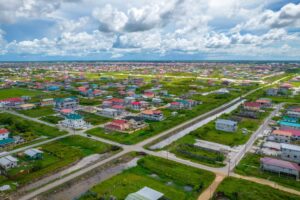Budgeting is an essential activity for managing personal finances and for allowing you to tackle the cost of living in Guyana.
The cost of living in Guyana can vary depending on factors such as location and lifestyle. In general, the cost of living in Guyana is considered to be relatively low compared to other countries in the region. According to data from Numbeo (https://www.numbeo.com/cost-of-living/), a website that provides cost-of-living estimates for cities around the world, the overall cost of living in Guyana is lower than in many other countries in the region, with a cost of living index of around 45.
Summary of cost of living in Georgetown, Guyana:
- Family of four estimated monthly costs are GY$514,624.4 without rent (using Numbeo’s estimator).
- A single person estimated monthly costs are GY$142,768.3 without rent.
- Georgetown is 53.3% less expensive than New York (without rent, see Numbeo cost of living index).
- Rent in Georgetown is, on average, 89.7% lower than in New York.
The cost of basic necessities, such as food and housing, is generally lower in Guyana than in many other countries. For example, the cost of a basic meal at a local restaurant can be as low as GY$1000 dollars, while a month’s rent for a one-bedroom apartment in a city can be less than GY$150,000.
However, the overall cost of living can be higher in the more urban areas such as Georgetown, the capital city and some other large towns, especially for expats. The prices for imported goods, and items such as electronics, can be higher in Guyana than in other countries.
It’s also important to keep in mind that the cost of living in Guyana can vary depending on your lifestyle. Someone who is used to a more luxurious lifestyle may find that the cost of living in Guyana is higher than what they’re accustomed to, while someone who is used to a more modest lifestyle may find that the cost of living is quite reasonable.
It’s important to also note that Guyana’s economy and living cost may vary depending on the political and economic situation and could be affected by various factors such as economic policies, global economic events, and the like.
Budgeting is an important tool for managing your finances, ensuring that you have enough money to cover your expenses and reach your financial goals.
There are several reasons why you should budget at home:
- Helps you understand your income and expenses: Budgeting helps you understand how much money you have coming in, where it’s going and where you might be able to make adjustments.
- Helps you prioritize spending: Budgeting helps you to identify your most important expenses and prioritize them over less important ones.
- Helps you save money: A budget can help you see where you can cut back on spending and help you save money for your future goals, like buying a house, car, or saving for retirement.
- Helps you avoid overspending: Budgeting can help you avoid overspending and getting into debt. With a budget, you can plan ahead for expenses and make sure that you’re only spending what you can afford.
- Helps you achieve your financial goals: Budgeting can help you achieve your financial goals by allowing you to set money aside each month to reach your goal.
- Helps you make better financial decisions: With a budget, you’ll have a clear understanding of your financial situation, which will help you make better financial decisions in the future.
Budgeting is an essential tool for managing your finances, it allows you to take control of your money, and make sure that you’re making the most of it. It’s not always easy, but it’s a habit that will yield long-term benefits.
Here are a few steps you can take to create a budget for your home:
- Determine your income: The first step in creating a budget is to determine your total income, including all sources of money, like salary, any rental income, or any other kind of income.
- List your expenses: Make a list of all your regular expenses, such as rent or mortgage, utilities, groceries, transportation, and entertainment. Try to be as detailed and accurate as possible.
- Assign a budget for each category: Once you know your income and expenses, assign a budget for each category. This will help you see how much money you have to work with and where you may need to make adjustments.
- Track your spending: Keeping track of your spending is an important part of budgeting. You can do this by writing down your expenses in a notebook or using a budgeting app. This will help you identify any areas where you may be overspending.
- Adjust your budget as necessary: Your budget is not set in stone, and you may need to adjust it as your circumstances change. For example, if you have an unexpected expense, you may need to cut back on other spending to make up for it.
- Stick to your budget: The most important step is to stick to your budget. It can be easy to overspend, but by staying committed to your budget, you’ll be able to reach your financial goals.
- Review and Re-evaluate: it’s important to review your budget and expenses regularly, this will help you to see if you’re staying on track, identify areas where you need to make adjustments and make changes accordingly.
It’s important to remember that budgeting takes time, effort, and consistency. It’s a process, not a one-time thing, but with time you’ll learn how to manage your money and achieve your financial goals.








1 Comment
Pingback: Financial Freedom in Guyana - Things Guyana